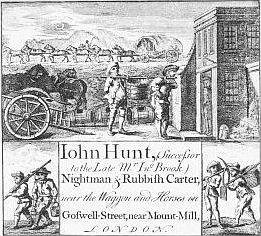Gong farmer facts for kids
A gong farmer was a special job in old England, especially during the time of the Tudors (around the 1500s). These people had the tough task of digging out and removing human waste from outdoor toilets, called privies, and from pits where waste collected, known as cesspits. The word "gong" was an old term for both the toilet itself and what was inside it.
Because this work was very smelly and considered unpleasant, gong farmers were only allowed to do their job at night. This is why they were sometimes called nightmen. The waste they collected was known as night soil. They had to take this waste far away from the town or city, usually to special dumping grounds.
Over time, as new ways to get rid of waste were invented, like pail closets and water closets (modern toilets), fewer cesspits were used. Today, emptying cesspits is usually done by special trucks called vacuum trucks, which use suction to clean them out.
Contents
What Were Old Toilets Like?
The word "gong" comes from an old English word, gang, which means "to go". In old towns, there were some public toilets, but not many. For example, in London around the late 1300s, there were only 16 public toilets for about 30,000 people!
People also had private toilets at their homes. These were often built over cesspits, which were like big holes in the ground, sometimes under cellars or in the yard. Some houses even had wooden slides to carry waste from upper floors down to the cesspit. These pits were not sealed, so liquid waste would soak into the ground, leaving only the solid waste to be collected.
The Stinky Job of a Gong Farmer
Cesspits always smelled terrible! And because solid waste built up, they had to be cleaned out every couple of years. This was the job of the gong farmers. They would dig out the waste and remove it. In the late 1400s, they charged about two shillings for every ton of waste they took away.
Working at Night
Being a gong farmer was considered one of the worst jobs during the Tudor period, even though it paid well. For instance, gong farmers working for Queen Elizabeth I at Hampton Court Palace earned sixpence a day. This was a good wage back then. However, their work meant they were often "up to their knees, waist, or even neck in human waste."
They could only work between 9:00 p.m. and 5:00 a.m. They also had to live in certain areas, away from others. Sometimes, the strong, bad-smelling fumes from the waste could make them faint or even stop breathing.
Gong farmers often hired younger boys to help them. These boys would lift the full buckets of waste out of the pit and work in small, tight spaces.
Moving the Waste
Once the waste was dug out, it was put into large barrels or pipes. These were then loaded onto carts pulled by horses. As more ordinary homes got toilets, they were often built in backyards with access from an alleyway. This way, the barrels of waste didn't have to be carried through the house to the street.
All the human waste collected had to be taken out of the town or city. It was either spread on open land or taken to special dump sites called laystalls, usually on the edge of town. A lot of London's cesspit waste was taken to dumps along the River Thames, like a place called Dung Wharf. From there, it was put on barges and used as fertilizer for farms and gardens. Some of these dumps became huge, like Mount Pleasant in London, which was over 7 acres big by 1780.
There were strict rules about how to get rid of waste. One gong farmer in London who poured waste down a drain was punished severely. He was put into one of his own pipes, filled up to his neck with waste, and then shown to the public with a sign explaining his crime.
Dangers of the Job
Gong farming was a very dangerous and smelly job. It was physically tiring, and there was no fresh air in the cesspits, making the night-long work even harder. The ceilings of the cesspits were not always strong, and they could rot and collapse.
In 1326, a gong farmer named Richard the Raker tragically drowned when the ceiling of a cesspit he was cleaning rotted and gave way. Because the job was so unpleasant, gong farmers were usually paid well. However, they were not respected and people often avoided them.
Later Changes in Waste Collection
From the early 1600s, bigger towns and cities started to hire people called scavengers. Their job was to clean human waste from the streets. A lot of this waste came from overflowing toilets, piles of dung, or from chamber pots (like bedpans) that people emptied into the streets from their windows. By 1615, the town of Manchester had 19 "under-scavengers" or "rakers," who were managed by two main scavengers.


